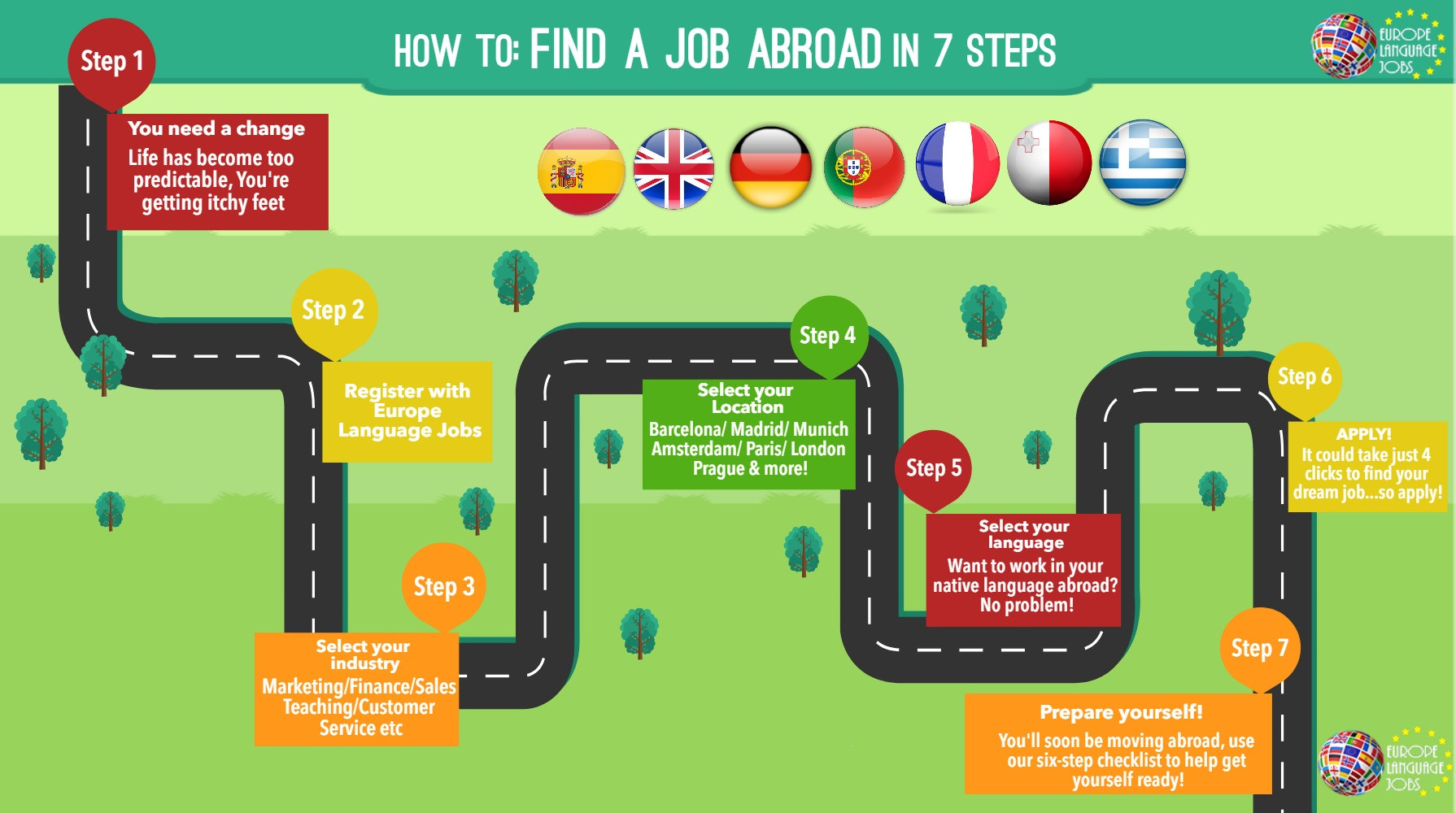Getting a job abroad is awesome! You get exposed to new experiences, people and cultures that you never would get to if you stayed at home, and you grow by overcoming the challenges of working abroad. Interestingly, finding a job abroad is almost certainly easier than you think!
From making yourself more interesting (who doesn’t want that), to forging strong relationships with friends, to the long-term brain and career benefits, let’s take a look at the 10 reasons why finding jobs abroad is awesome!
Be sure to keep an eye out for the infographic illustrating the process of finding work abroad in just 7 steps!
Here are 10 reasons to find a job abroad now:
1) Make yourself more interesting
Let’s be honest, those who have had fun experiences in places we’ve never been to are just cool.
Let’s say you’re stuck in the office 9-5 for 50 weeks a year while someone else is hiking through forests, swimming in the ocean, camping on a mountain, or partying in the most fun clubs in the land. Maybe they're even doing all that in a foreign country?
I imagine you would be envious of that, right?
That’s not to say life has to be one or the other! It’s completely possible to have these amazing experiences, working a completely normal job at the same time.
It's just that, if you stay in the same place (unless you’re one of the lucky few born in a perfect part of the world), you’ll probably need to move around to experience the wide variety of what the world offers!
2) Finding work abroad has its difficulties: It forces you to leave your comfort zone
Is it hard to get a job abroad?
It's more difficult to find work abroad than at home for a few reasons: language barriers, lack of contacts, awareness of vacancies and even not knowing which companies are in the area can make the process of searching for a job feel a million times more difficult.
One way around this problem is to register with a job board like Europe Language Jobs. It does most of the hard work for you, collating all the information regarding various positions and attractive employers in countries and cities all over Europe, so you can quickly & easily check in one place for vacancies in your chosen field & destination.
Not to mention, all their services are free, so getting professional help costs you literally nothing!
Getting out of your comfort zone can come in the form of a change in your routine. This can be a big shock to the system and might require some adjustment, but this will help you in a few different ways.
Firstly, it forces you to come up with a new routine or incorporate new activities, maybe ones you enjoy that you would never have experienced back home. For example…
Let’s say you used to do a 5km run through the park before work, but now you live in Barcelona. Finding a stretch to run more than 5 metres is unheard of (some say run on Diagonal, but come on, it’s just a long, busy road, rubbish for training). So what do you do? Just stop?
No! You adjust!
You can always find alternatives - something you can do in Barcelona that you can’t in England (unless you’re a bit of a maniac), is have a morning swim in the sea. It’s refreshing, beneficial for your health, and better on the joints than running.
Additionally, it’s free, and you can even relax on a nice beach before or after work. Not a bad way to start the day!
3) New experiences abroad
Life is short - use the time you have to experience as much of it as you can. Growing up and living your life in the same place has its benefits: it's comfortable, you have a safety blanket of family and friends, you know where everything is, can easily find all the fun spots, and you can settle into a comfortable routine.
For many individuals, however, this way of life can be negative as well as positive.
For me personally, living in the same place for too long becomes really dull. The first few days and weeks in a new place are a bit overwhelming as you are usually without friends and family. The most difficult thing for me was not knowing where the good shops are as food is my priority.
I remember my first weekend in Barcelona. Nobody told me all the supermarkets close on a Sunday, and if you need to buy food, you have to visit the smaller corner shops where the food is half the size for twice the price, a nightmare.
The difficulties of moving to a new place are outweighed heavily by the benefits, all the places, activities, people, AND FOOD make it worth the initial struggle!

4) Working abroad: an easy way to boost your employability
To many hiring managers, seeing a candidate who has experience living abroad is a good indicator of a few things. Some of them we have spoken about already, and some we haven’t:
- Adaptable - getting a job abroad requires adapting to a completely different environment, and sometimes, a new working culture, too!
- Brave to take calculated risks
- Likely has experience working with different personalities & dealing with various cultures
- Speaks a second language that would be useful for us?
- Might have a network of contacts in a city or countryn we could take advantage of
5) Higher paid jobs abroad - broaden your job search to increase your salary
Maybe you want to be an English teacher? In the UK, you can earn around 26k on average with experience - this is for working a 40-hour week and countless more unpaid hours at home marking, planning classes, attending meetings, etc.
Compare this with teaching in another country like Spain, where you can be earning around €20 per hour and live comfortably on a 20-hour week with just a few hours of planning & marking. Not to mention, enjoy a ton of free time! It just makes sense to go where you will be valued, right?
Right!
This is a fantastic perspective for some. Certain jobs, such as teaching, certainly are better paid, but in some places, like Spain and Greece, salaries outside of teaching are relatively low compared to places like Germany.
It is important to remember this, but if this is the case, then why should workers from countries with excellent salaries like Denmark, Germany, or the Netherlands move abroad? The phrase 'money isn't everything' is more accurate than many consider it to be.
German, Dutch & Nordic speakers already have considerably high salaries, so why should we move abroad?
Many people forget that the only reason we try to earn and collect money is so we can use it to enjoy our lives. Doing fun things, living in a nice house, i.e. having a high quality of life.
The quality of life in...let's say Reykjavik, Iceland, is widely known to be higher than in London, for example (take a look at the survey from the European Commission to find the 10 Happiest Cities in Europe if you don't believe me).
Where do you think salaries are higher? London.
But which place ranks 3rd on the list? Reykjavik.
London doesn't even make the list.
Using the example of Denmark (because I've used it already and companies are desperate for Danish speakers), I've spoken to many Danish expats and those who have moved to Denmark in my research for this article, and a lot of them say the same thing:
Life can be a little boring for locals & expats and many of the expats I spoke to felt like an outsider even after living and working in Denmark for years and speaking fluent Danish.
Reasons to leave Denmark and move abroad that I heard repeatedly were interesting and I've compiled a shortlist:
-
Weather
-
Quality of life (as in activities: events, bars, things to do, etc)
-
Explore a new culture
-
Have an adventure
-
A new challenge (this came up more than any other reason)
-
More open society (less strict & easier to make friends)
-
Job opportunities in Denmark aren't great at the moment
-
A wider variety of job opportunities abroad
-
Career advancement abroad is much better
-
Better medical care
So, for German, Dutch or Danish speakers (and any Nordic language, actually), the reasons to move abroad can go beyond financial and focus on the quality of life, so you're ahead of the game!
Because German, Dutch, and Nordic language speakers are in such massive demand across Europe, you are in an excellent position to negotiate a higher salary. So be quick, because the demand for candidates who speak these languages currently far outweighs the supply.
Take advantage of this and get yourself a job abroad quickly, before everyone reads this and they fill the vacancies before you!
6) Meet new people & forge strong, long-lasting relationships
When I first moved to Barcelona, through flatmates, coworkers, going out, and meeting strangers, we quickly grew a ridiculously large group of around 30 people. Fun for a party, but for just going for a beer or a day out, it was a nightmare.
What tends to happen is a 'trimming of the fat' (I don't mean boot out the fat people). I mean that you usually find those that you get along with without really making any connection on a level deeper than 'it's fun to get drunk together' tend to find other friends that they do make this connection with, and you slowly go your separate ways.
You are left with a much smaller but more fun group - this is exactly what happened to me. After the first month of partying, many people started to go their separate ways, and we ended up with a group of about 8-10 friends that forged some lifelong relationships.
Having a few close friends to watch movies, go camping, have dinner or meet to talk about anything is so much more rewarding than having 20 mates to go out drinking (although I'm not knocking it, that's amazing, too).
Many of these friends are from America and so couldn't stay longer than a year in Barcelona, but the friendships we made were such that we continue to stay in touch. Whether it’s sending dumb memes or just checking in with each other every now and again, and planning to visit each other in the future.
Making friends for life despite being in different countries and continents can be difficult but worth it for the times you can enjoy each other’s company and support. I think it's something to do with being away from friends & family, but people seem to be more open to strong relationships abroad and appreciate them when they're lucky enough to find them.

This isn't me and my friends but it's a nice picture and illustrates my point.
7) Get paid to travel - make a career from hopping from one country to another!
Spend 5 minutes (actually, 5 seconds) on Instagram, and you can see everyone with a camera fancies themselves as a traveller or wishes they could be one. People want to travel but don’t seem to know how to go about it.
But also, finding a job abroad is much easier than they think. Finding work abroad can be easier than you think because once you have chosen your destination and registered with Europe Language Jobs, you’ve made two ENORMOUS steps towards getting paid to travel.
Do you want to spend a year in Berlin? Cool, now you want to travel to Madrid and perfect your Spanish? Go ahead! Oh, now you want to live in Prague for a while? There is nothing stopping you…seriously, nothing. It’s way easier than you might think.
8) Grow a good, professional, international network - boost your career
Expanding your network of friends is not the only social benefit of working abroad. Expanding your professional network is an efficient way to push yourself into the professional world and make contacts.
Who knows, maybe in the future, you will be able to take advantage of them, or be in a position to help someone else? Possibly through receiving a recommendation about a vacancy or giving one to someone you think would be a great fit for a vacancy you’ve seen.
It’s sad to say that jobs don’t always go to the best person for the job. It is often contacts that play an enormous part in the job search. It isn’t fair at all, but what we have to do is put in the effort to make contacts so that we can get ourselves on the other side of the door and get ourselves the best job.
9) Learn to deal with different kinds of people
Meeting different kinds of people means you learn how to deal with different personalities. Cultural differences in the way we are raised and the accepted practices can sometimes be shocking.
If you have the necessary experience and knowledge on how to handle these different situations, then you are in a great position when going for that job/promotion, working in a multicultural environment, or even attending meetings with narcissistic egomaniacs who have no idea what they're doing but whom you're still forced to deal/negotiate with.
The photograph below is completely, 100%, totally not related to what I just said.

10) Learn a new language
Learning a second language is both challenging and fun. It feels great when you get the hang of it, but did you know that it can help offset certain diseases like Alzheimer’s? That’s pretty cool, isn’t it?
But the benefits don’t stop there. A few more benefits to learning a foreign language include:
- Higher salary: skills, experience & languages make you extremely valuable!
- Improves analytical skills
- Travelling is so much easier; there are many countries that speak English, but you will always find people who do not. It would be nice to be able to ask for directions back to the city from the middle of nowhere, right?
- Expands your view of the world & other cultures.
And the best way to practice a language? Going abroad, of course!
HOW To Find A Job Abroad
Now that we know why finding a job abroad is awesome, use this infographic I created to provide you with information about how to find a job abroad in just 7 easy steps!

If you're interested in moving abroad, go check out our six-step checklist for moving abroad! You'll see that with our advice, the process is quick and entirely painless.
I hope this article has helped ease any worries or doubts you may have had about finding a job abroad and has proved to you that working abroad is good for you. I truly believe that the benefits to relationships, your career, long-term health, and your career are 100% worth the difficulties that come with working abroad.
So come on! I’ve told you how to do it and what all the benefits are, now go find yourself a great new job in record time! Also, if you think I missed any reasons as to why finding a job abroad is awesome, let me know so I can add them to the list!
.jpg)








Jessica 1y ago
i love this
i love this